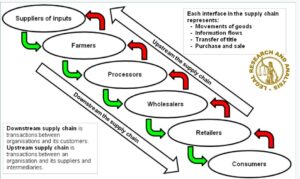
DISRUPTION IN UK’S FOOD SUPPLY CHAINS

A report coming from the United Kingdom (UK) says that grocery stores are facing a paucity of produce, which is not solely because of bad weather hitting the crops but also because they are unwilling to pay inflated prices for vegetables and fruits.
What is interesting to note here is that supermarkets in Britain are following each other by introducing a ceiling on customers’ purchases. One such example is ‘Tesco’, which is the UK’s largest grocery and general merchandise retailer. It has recently followed the footsteps of its competitors ‘Asda’ and ‘Morrisons’ by imposing purchase limits on salad products for customers. Another reason cited for such limits is to disable wholesalers from buying in bulk and thus engage in hoarding.
Indeed, crops were badly hit due to non-conducive weather conditions in southern Europe and north Africa but the pockets of Britons have felt a squeeze owing to inflation too, thereby reducing their purchasing power and increasing their cost of living. However, there are suppliers like ‘Eosta BV’, engaged in the supply of organic products, who claim that there is no shortage rather retailers are not paying the right price. It says that if retailers pay adequately, then there is sufficient availability of food.
BRITAIN’S GROCERY INFLATION
As energy prices have surged, retailers’ profit margins have dwindled. To make up for margins, food suppliers, whether major like ‘Nestle’ or minor like ‘Eosta’, have increased prices. As of statistics available at the end of January 2023, grocery price inflation in the UK touched a record of 16.7%. People in the UK are reporting a day-by-day reduction in the availability of basic perishable edible items. Empty shelves are becoming a common sight in supermarkets. The onus to rectify the situation has been put on retailers by certain wholesalers and independent grocers. It is being said that if retailers pay the extra cost, the situation can be salvaged.
RATIONING OF FRUITS OF VEGETABLES
Supermarkets giants in the UK like ‘Asda’ have allowed shoppers to buy only three units each of veggies like tomatoes, pepper, broccoli, raspberries, lettuce, and cucumbers. ‘Morrisons’, another supermarket, has allowed its shoppers to purchase only two units each of lettuce, peppers, cucumbers, and tomatoes. The president of the UK’s National Farmers Union has asserted that nobody wants to ration perishables, but there are challenges in making certain food products available. The Union has cautioned against panic buying. Experts point out that if the cost of energy keeps surging, the growers would ultimately refrain from growing fruits and vegetables since the production process involves the consumption of energy. Farmers in the UK express that if grocery stores backed them with the increase in the cost of production, they would have been in a situation to grow more.
A CHANCE TO CULTIVATE A KITCHEN GARDEN- SAYS CLAIRE RATINON
Famous writer and organic food grower, Claire Ratinon has suggested indulging in sowing seeds to have some homegrown leafy vegetables. She suggests choosing salad leaves like mustard greens, chard, and lettuce as they can be cultivated in a small space that is preferably sunny. Also, such leafy vegetables can be grown in a container or on the ground.
After four to eight weeks, the seedings would be transformed into young plants. When the plants seem established, one can start by plucking the outer leaves leaving the inner core intact so that the new growth continues. She also recommends planting leafy herbs and microgreens. The increased cost of living woes can to the extent of food demands be somewhat cured if advice by Claire Ratinon is paid heed to.
The current problems with the supply chain are expected to last for some considerable weeks. Supermarkets meanwhile are working with farmers to provide customers with a variety of fresh produce. The present government is also being criticized for not doing enough to shield farmers from increasing energy costs. The farmer’s unions assert that vegetable growers were ignored in the wake of rising energy costs but Royal botanic gardens were adequately protected. While some experts expect respite from supply chain disruptions in half a month some feel that the number of empty shelves in supermarkets would increase if the government does not intervene. All-in-all the picture does not seem rosy and improvement in the situation is possible only when the farmers, government, suppliers, and supermarket giants work in harmony to cure supply chains.








